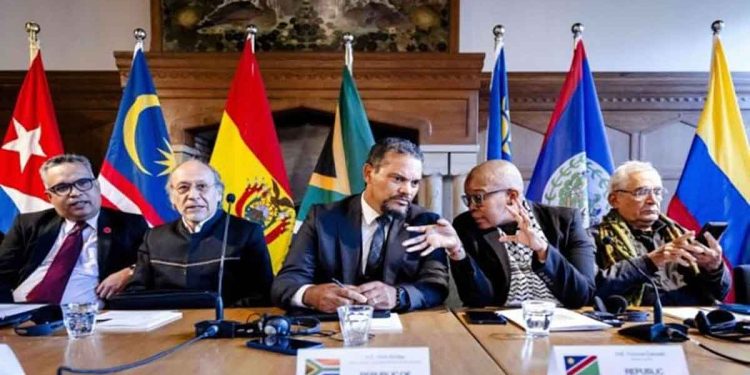Arab Organisation for Human Rights in the UK (AOHR UK) has sent letters to the member states of the Hague Group urging them to convene the Tenth Emergency Special Session of the UN General Assembly to break the international silence in the face of crimes committed by the Israeli occupation that defy description.
AOHR UK praised the Hague Group—comprising South Africa, Malaysia, Colombia, Bolivia, Cuba, Honduras, Namibia, Senegal, and Belize—for taking the lead since the onset of the Israeli assault in confronting these atrocities. The group has taken concrete steps, including referring the matter to the International Court of Justice (ICJ), securing provisional measures to protect civilians from genocide and to ensure the delivery of humanitarian aid. Member states also imposed comprehensive arms embargoes and banned critical exports, while severing diplomatic ties with the occupying power.
AOHR UK stressed that the international community deeply values the group’s principled stance, which had raised hopes that many more countries—particularly Arab and Islamic states—would join their efforts. However, these hopes were largely dashed, as many of those countries either maintained relations with the occupation—openly or in secret—or, more troublingly, remained silent during one of the most dangerous periods the people of Gaza have faced.
Given this paralysis, AOHR UK urged the Hague Group to take action through the General Assembly under the Uniting for Peace resolution, which allows the General Assembly to act when the Security Council fails to do so due to the veto of a permanent member, especially in matters threatening international peace and security.
This call comes at a time when Gaza has reached an unprecedented level of starvation, exacerbated by the restriction of aid distribution to the Gaza Relief Foundation—an entity operating under the direct supervision of the Israeli military to serve its own agendas. Evidence shows that this foundation has weaponised aid and turned distribution centres into death traps. Since it began operating on 27 May 2025, over 1,373 Palestinians have been killed at or near these centres, and thousands more have been wounded.
AOHR UK highlighted that the occupation’s exclusive reliance on this foundation to distribute aid serves a dual purpose: to provide a façade suggesting aid is being delivered in order to deflect criticism, and to prevent UN agencies from playing their role in delivering aid to the majority of those in need—particularly those unable to risk approaching the foundation’s four centres. This policy has led directly to widespread hunger and the collapse of the food system across Gaza. People are physically deteriorating from malnutrition, with 193 reported deaths due to starvation, including 96 children. Thousands more—particularly children, the wounded, the sick, and the elderly—are now at imminent risk of starving to death.
AOHR UK emphasised that the urgent priority must be saving Gaza’s population from death by hunger and bombardment—not issuing statements or holding symbolic conferences like the one recently convened in New York to recognise the State of Palestine. What is the point of declaring statehood on paper while the Palestinian people are being exterminated? Current statistics show that over 200,000 people have been killed or injured since 7 October 2023—10% of Gaza’s population—and 95% of residential areas have been destroyed. Around 1.9 million people, nearly 90% of Gaza’s residents, have been displaced and remain under threat of further forced displacement.
AOHR UK noted that the Tenth Emergency Special Session of the UN General Assembly has convened three meetings to date: on 26 October 2023, 10 May 2024, and 4 December 2024. These meetings produced important resolutions calling for a ceasefire and the entry of humanitarian aid. However, as with the ICJ’s provisional measures, these resolutions have not been implemented. This stands in contrast to historical precedents—such as the 1956 Suez Crisis—when General Assembly resolutions led to the deployment of UN forces and forced the withdrawal of British and French troops from Egypt.
The failure to implement General Assembly resolutions concerning the aggression against Gaza should not lead to despair or abandonment of this platform, as there is currently no alternative for exerting meaningful pressure on the occupying power and its backers. Military intervention is not being requested—though arguably justified—but at the very least, the international community must send humanitarian convoys under the flags of participating countries and under UN auspices. Rafah should be turned into an international operations hub, with permanent diplomatic representatives stationed there until aid is delivered and the aggression is halted.
Any step in this direction—or any action that strengthens efforts to deter the occupying government at this critical juncture—is of utmost importance. Reports indicate that this government has no intention of agreeing to a ceasefire and is preparing for a full-scale invasion of Gaza. This would result in a mass slaughter, further doubling the death toll and advancing its plan of forced displacement.
The children, youth, women, sick, and wounded of Gaza—and with them, the entire global humanitarian conscience—are crying out every day for urgent intervention to save them from the machinery of death that continues to destroy their lives. It is a disgrace to ignore these calls for action and to turn a blind eye to crimes that are unprecedented in the history of warfare. These pleas can still be answered, even within the minimum capabilities of existing international mechanisms.



























